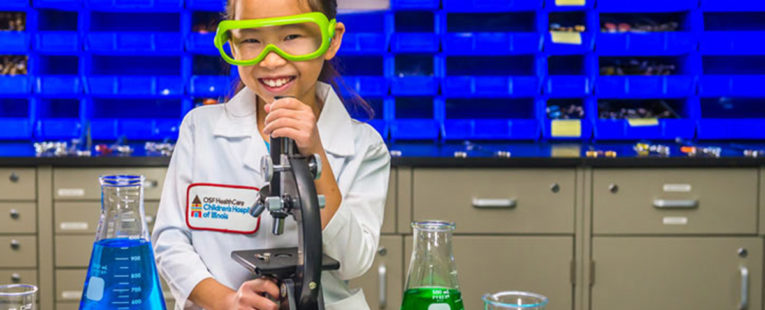Ru Abla is your typical 8-year-old. She is a spirited, fun-loving, vibrant little girl with big dreams. But what you might not suspect is that she and her mother, Sandra, make the 1 ½-hour drive from Decatur, Illinois, to Jim and Trudy Maloof St. Jude Affiliate Clinic fat OSF HealthCare Children’s Hospital of Illinois in Peoria every four weeks. Why?
Ru was born with an inherited blood disorder called beta thalassemia major, also called Cooley’s anemia. Considered rare in the United States, the blood disorder predominately affects those of Mediterranean, Asian or African ancestry.
Beta thalassemia major prevents the body from making red blood cells. Therefore, Ru requires continued blood transfusions to receive healthy red blood cells.
Finding the right care
When Marc and Sandra Abla were deciding where they would seek treatment for their daughter, Ru, they turned to their good friends, who also had a daughter with the same condition.
“My friend said, ‘Oh, you need to check out St. Jude at OSF Children’s Hospital,” Sandra said.
Since then, the Ablas have been pleased with their decision.
St. Jude Affiliate Clinic has been serving children, teens and young adults in Illinois and neighboring states with cancer and blood-related disorders for over 40 years. It was the nation’s first St. Jude-affiliated clinic.
“The St. Jude Clinic at OSF Children’s Hospital has been a huge blessing to us, both financially and emotionally,” Sandra said. “Ru has had very little trauma or emotional struggles with her treatment because of the way they deliver care.”
Dr. Mary Beth Ross – a pediatric hematologist – has been caring for Ru since she started treatment at St. Jude.
“She listens to our needs and concerns and is constantly looking into new ideas and studies to make treatment even easier,” Sandra said.
Making treatment fun
Because St. Jude caters to children, teens and young adults, the clinic has a unique approach to how care is delivered.
Depending on the type of treatment, most kids can do arts and crafts, watch movies, play in the playroom or do other interactive activities while receiving their treatments.
“I love that Ru isn’t confined to her bed during her transfusions,” Sandra said. “I know some other children with beta thalassemia, who seek treatment at other hospitals, and they are confined to their beds for the duration of their treatment because of hospital policy.”
Aside from Ru needing blood transfusions every four weeks at the clinic in Peoria, she also goes to St. Jude Children’s Research Hospital in Memphis once a year to get an MRI of her heart and liver to check for iron deposits.
Iron is a natural product of the blood, and the body has no functional way of getting rid of it. So when someone has blood transfusions on a continual basis, they receive extra iron the body doesn’t need. If the body stores too much iron, it could lead to organ failure. Therefore, Ru takes medication to pull the extra iron out of her blood. As a precaution, the MRI checks that there is no iron being stored in her heart and liver.
“That’s one of Dr. Ross’s goals is to have the MRI software available in Peoria to save us the annual trip to Memphis,” Sandra said.
Ru’s outlook on life is certainly one to learn from. Her infectious smile and upbeat attitude would make anyone’s bad day turn into a good day. When asked what her plans are for the future, Ru said there are so many possibilities. But she ultimately wants to do something to help people someday.
“My hope is that she grows up happy and healthy, has a strong faith in God and goes after her dreams and what she wants to be,” Sandra said.
Last Updated: February 9, 2022
